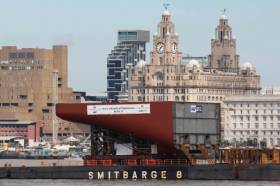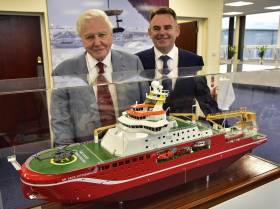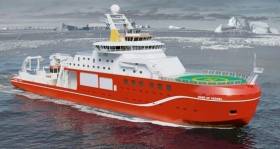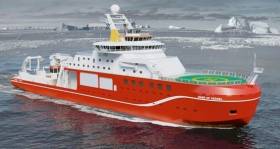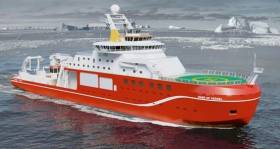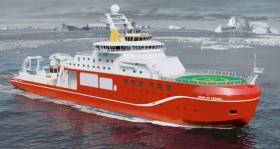Displaying items by tag: Boaty McBoatface
Belfast Welcomes Polar Research Vessel Sir David Attenborough
Belfast Lough welcomed the RRS Sir David Attenborough for the first time this past weekend for a crew change.
And its Captain Matt Neill, from Magilligan near Coleraine, told the Belfast Telegraph was “made up” to bring the ship to Northern Ireland.
The £200 million vessel has been conducting scientific trials en route to Belfast from Macduff in eastern Scotland, ahead of a planned Antarctic mission later this year.
While a public poll to name the research ship resulted in a top vote for ‘Boaty McBoatface’, that irreverent moniker was instead given to one of its robotic submersibles.
The Belfast Telegraph has more on the story HERE.
UK Shipyard Cammell Laird New Polar Research Ship Named RRS Sir David Attenborough
In the UK, the newest polar research ship is to be formally named the RRS Sir David Attenborough today by the Duke and Duchess of Cambridge.
The royals will follow tradition by smashing a bottle of champagne against the hull of the marine science research vessel.
Special guest Sir David Attenborough will attend the naming ceremony which will be live-streamed from 13:30 on the BAS website: www.bas.ac.uk/live
A three-day public celebration, hosted at the shipyard by British Antarctic Survey and Cammell Laird, aims to inspire and inform people about polar science, engineering and technology – and why it matters to everyday life. The event is focussed on our future – young people will play a role in the celebrations. Primary school students from the STEM Polar Explorer Programme will meet the Duke and Duchess as they take a private tour of the ship. Local primary schools that have been studying the Antarctic and climate change will take part in a ‘penguin parade’.
Commissioned by the Natural Environment Research Council (NERC) - part of UK Research and Innovation, built by Cammell Laird and operated by British Antarctic Survey, this new research platform will transform how ship-borne science is conducted in the Polar Regions. It is part of a major Government polar infrastructure investment programme (a total of £300M) designed to keep Britain at the forefront of world-leading research in Antarctica and the Arctic.
Science Minister Chris Skidmore says: “This is an incredibly exciting moment in our scientific history. The RRS Sir David Attenborough will allow us to make a major leap forward in our understanding of the environment.
“As the first G7 nation to legislate for net zero carbon emissions, it is vital that we invest in scientific efforts that will help us deliver on this. From our world leading capability in earth observation satellites to our ground-breaking research into plastic-eating enzymes, the UK continues to lead by example as a truly green economy.
“This new vessel is an incredible feat of engineering. But it also recognises one of our most respected and admired figures - Sir David Attenborough. Nobody has done more than David to spread the message that we should understand and protect our planet, and I'm delighted that he is being honoured in this naming ceremony.”
Professor Duncan Wingham, Executive Chair NERC, says: “This is an exciting day for all of us as we celebrate the naming of the RRS Sir David Attenborough. Today's ceremony marks the start of an important era that will help ensure world-class polar and deep ocean science in the decades to come. While the Polar Regions might seem remote to the UK, it is vital to understand that the poles are where we first see the impact of global environmental changes.”
Sir David Attenborough says: “This is the third milestone event that I have attended during the construction of this superb ship, and I have enjoyed watching progress from keel-laying till now. It is a remarkable engineering achievement. We all need this ship. Our world is changing and it’s clear that people around the world – especially the young – are becoming more and more concerned about a climate catastrophe. But human beings are resilient and skilful. If we pay attention to the scientific knowledge that those who will sail in this ship will gather, then we will stand a much better chance of finding a way to deal with what lies ahead.
In the coming weeks specialist engineers will complete the interior fit-out. A programme of technical and equipment testing will take place around the River Mersey and in deeper waters around the UK. Ice trials in the northern hemisphere are planned from March 2020, followed by a science rehearsal cruise from August 2020. The ship is scheduled to enter full service from October 2020.
Professor Dame Jane Francis, Director of British Antarctic Survey, says: “This magnificent ship will take UK scientists deep into the heart of the ice-covered polar seas. With state-of-the-art technology they will discover how drastically the polar oceans and the ice have been changed by our actions. The Intergovernmental Panel on Climate Change Special Report on the Ocean and Cryosphere warns that the oceans are warming and becoming more acidic with CO2, glaciers are melting and sea level is rising across the planet, and the polar bears and penguins are losing their homes. This ship will take us to the ends of the Earth to help us understand our future world.”
Sir Mark Walport is Chief Executive of UK Research and Innovation. He says: “The RRS Sir David Attenborough is one of the most advanced polar research vessels in the world and will transform how ship-borne science is conducted in the Polar Regions. It will provide scientists with state-of-the-art facilities to undertake crucial research into the impact of global change on our oceans, marine biodiversity and climate, and ensure that the UK remains at the forefront of polar science.”
Cammell Laird CEO John Syvret CBE, says: “This is a historic day for Cammell Laird, and todays naming of the RRS Sir David Attenborough, arguably one of the most complex vessels afloat, underpins our re-emergence to the premier league of the global shipbuilding community. It has taken 20 years to regenerate this infrastructure, capability and capacity, and I am extremely proud of all who have worked tirelessly to achieve today’s milestone. This vessel represents our greatest challenge to date, and I thank NERC and British Antarctic Survey for their trust and ongoing support to deliver this iconic vessel. This is the “Pride of Merseyside” and my special thanks go out to our workforce, TU, management and staff, together with our supply chain and all their families for their dedication and commitment to the project and the company.”
Broadcaster and naturalist, Sir David Attenborough says: “This is the third milestone event that I have attended during the construction of this superb ship, and I have enjoyed watching progress from keel-laying till now. It is a remarkable engineering achievement.
We all need this ship. Our world is changing and it’s clear that people around the world – especially the young – are becoming more and more concerned about a climate catastrophe. But human beings are resilient and skilful. If we pay attention to the scientific knowledge that those who will sail in this ship will gather, then we will stand a much better chance of finding a way to deal with what lies ahead.”
A new work – ‘Ark’ – by Poet Laureate Simon Armitage CBE, commemorates the naming. The poem will be premiered in front of thousands of people gathered on the shipyard quayside to watch the ceremony.
The British Pobjoy Mint has created a commemorative £2 coin featuring the ship and a 50p coin featuring the autonomous submersible Boaty McBoatface.
A business breakfast event - Meeting the 1.5 degree challenge. Can innovation in low carbon technologies create a safe and sustainable future for polar buildings and ships?
Chaired by: Financial Times’s award-winning associate editor and business columnist Pilita Clark.
The naming ceremony kicks off a three-day immersive festival of science, engineering and ship building. ‘Ice Worlds’ will bring the Polar Regions to life with over 20 exhibition stands. The festival will be adjacent to the RRS Sir David Attenborough in the Cammell Laird shipyard.
Friday 27 September is set aside for pre-registered schools.
Saturday 28 September is a day for families. A few tickets are still available here:
#ports&shipping - A major feat of UK engineering took place last week as the “stern section” of the new British polar research ship, RRS Sir David Attenborough was transported by barge from Newcastle to Birkenhead.
The barge departed from the Hebburn-based shipyard A&P Tyne (Newcastle), part of A&P Group, to the Cammell Laird’s shipyard in Birkenhead.
The new ship is a major UK Government investment in frontier science. Commissioned by NERC, and built by the world famous marine engineering company Cammell Laird Shiprepairers & Shipbuilders Ltd. The vessel is a Rolls-Royce design, and will be operated by British Antarctic Survey when the ship enters service in 2019.
The transportation of the 899 tonne steel block (known as Block 10) – which is the equivalent weight of 71 London double decker buses, and more than 23 meters long and 24 meters wide – is a major engineering challenge and a significant milestone in the build.
It further capitalises on the broad commercial skills and infrastructure on the east and west coast of the UK and marks another significant milestone in the Cammell Laird construction programme.
This ‘load-out’ operation is the outcome of a collaboration between Cammell Laird and A&P Group and a clear demonstration of the benefits that a flexible and co-ordinated effort brings to the construction of the RRS Sir David Attenborough and to the UK ship-building industry.
For much more on the newbuild from Cammell Laird, click here
Sir David Attenborough Lays Keel for New £150m Polar Research Ship
#BoatyMcBoatface - Sir David Attenborough along with more than 1,000 people attended the keel-laying ceremony of a new £150m polar research vessel at a UK shipyard yesterday.
Construction of RSS Sir David Attenborough was officially started by the world-renowned naturalist and broadcaster, after whom the ship is named. Noting earlier this year the public through an online poll originally had chosen a different name 'Boaty McBoatface' as a clear favourite that proved controversial. The newbuild's robotic underwater vehicle will however be named 'Boaty McBoatface'.
At the ceremonial event at Cammell Laird's shipyard site, Birkenhead in Liverpool City Region, Sir David started the “keel laying” process by initiating the lifting by crane of the first hull unit on to the construction berth. This unit, weighing around 100 tonnes, includes part of the ship’s keel and is the first of 97 units which will be erected to form the entire hull of the research ship.
When the ship sets sail in 2019, the RRS Sir David Attenborough will provide a research base to help scientists tackle some of the most important issues facing humanity, including climate change, future sea level rise and the impact of environmental change on marine life.
Speaking at the ceremony Sir David Attenborough said: “It is an honour to be invited to take part in the keel-laying ceremony. The Polar Regions are not only critical for understanding the natural world but they also have an enormous appeal for journalists, broadcasters and the public.
“I have had several opportunities to experience the power of these places first hand. This new ship will ensure that scientists have access to these enigmatic regions to uncover secrets that we can only imagine at this point. Scientists working on this new ship will inform everyone about our changing world for generations to come.”
#BoatyMcBoatface - It's been confirmed that Britain's latest polar research vessel will not be named Boaty McBoatface despite that tongue-in-cheek moniker running away with the public vote in a controversial online poll.
Instead, the £200 million (€253 million) marine science vessel will carry the name RRS Sir David Attenborough in honour of the legendary natural history broadcaster, as the Evening Standard reports.
Sir David said he was "truly honoured" by the decision to name the vessel after him, coming on the eve of his 90th birthday.
The move comes after UK Science Minister Jo Johnson stepped in to save face for the National Environment Research Council (NERC) when Boaty McBoatface, suggested by a radio DJ as a joke, secured the highest share of votes.
However, the public's choice will not go completely unrecognised, – as the name is set to be given to one of the vessel's remote operated vehicles, or ROVs, used for undersea exploration. The Evening Standard has much more on the story HERE.
Meanwhile, the head of the NERC faces a grilling by Westminster MPs next week over how the Name Our Ship competition took such a farcical direction, as the Guardian reports.
RIP 'Boaty McBoatface' As Minister Steps In To Save Face
#BoatyMcBoatface - Not so fast, Boaty McBoatface! Despite the public voicing their choice of name for Britain's latest marine research vessel, the UK's Science Minister has put the kibosh on that notion – to much disappointment online.
As reported yesterday on Afloat.ie, the head of the National Environment Research Council (NERC) was left with a dilemma after 'Boaty McBoatface' was the runaway winner in an public poll to name the £200 million (€253 million) polar research ship.
The online poll included nominations as worthy as Antarctic explorer Henry Worsley and renowned natural history broadcaster David Attenborough, and as smart-alecky as It's Bloody Cold Here.
But according to The Irish Times, the final decision rests with Science Minister Jo Johnson, who was diplomatic in saying that while the "imaginative" suggestions for names would be "reviewed", he favoured one that “captures the spirit of scientific endeavour”.
The reaction online has been swift, with the minister being branded an "anti-democrat, humorless spoilsport" for overruling the people, prompting some to call for the resignation of Prime Minister David Cameron.
That's according to the Huffington Post, who also quoted former Royal Navy head Admiral Lord West on the 'controversy'.
“It’s the typical thing of Brits going mad," he said, "normally silly season, not at this time of year."
#BoatyMcBoatface - The votes are in and 'Boaty McBoatface' is the clear choice in a public poll to name a new British polar research vessel, according to the Guardian.
As previously reported on Afloat.ie, bosses at the National Environment Research Council (NERC) were left red-faced by the popularity of the tongue-in-cheek name, one of a number of witticisms nominated by the public in an online pills to name its latest £200 million (€253 million) research ship.
Now NERC chief executive Duncan Wingham, who holds final say on the naming rights, is left with the difficult decision of whether to go with the popular choice, or preserve the credibility of the advanced polar research fleet among the marine science community.
As it turns out, it's not the first time that marine science has had an awkward brush with the public online – as an effort by Greenpeace to draw attention to whaling in the South Pacific led to a humpback whale being lumbered with the dubious monicker Mister Splashy Pants.
However, as the AV Club reports, that name ended up being to the benefit of Greenpeace's campaign against Japanese whaling – a subject back in the news after confirmation of hundreds of whale kills on a recent Antarctic expedition.
#BoatyMcBoatface - The operators of a new British marine research vessel may be left red-faced as an online poll to name the ship has a clear favourite: Boaty McBoatface.
The tongue-in-cheek submission is far ahead of rival choices such as David Attenborough in the public vote to name the Natural Environment Research Council's (NERC) new polar research ship, as The Independent reports. SEE VIDEO BELOW.
And it's not the only witticism in the running, with Usain Boat, Ice Ice Baby and Notthetitanic also proving popular on social media ahead of the voting deadline on 16 April.
Whatever name it eventually gets, the £200 million (€253 million) vessel will carry up to 90 scientists and support staff on lengthy research voyages to the Arctic and Antartica, forming part of what NERC describes as "the most advanced floating research fleet in the world".
The Independent has more on the story HERE.



























